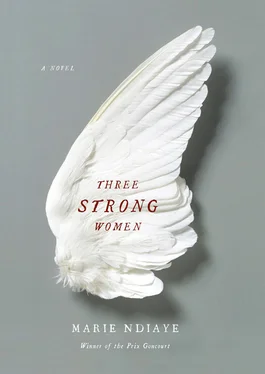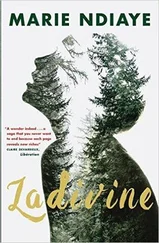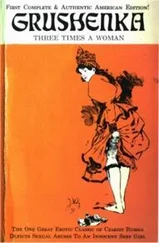He’d stayed put, not daring to go into the apartment.
He hadn’t run away, he just hadn’t gone inside.
He’d been content to defend his interests while avoiding any risk of letting the cat out of the bag.
Feeling very tired all of a sudden, he turned off the road into a plantation of poplars.
He parked on a grassy track where the last row of poplars gave way to a wood.
He was so hot in the car he thought he’d faint.
The ham and soft white bread sat heavy in his stomach.
He got out of the car and threw himself on the grass.
The earth was cool and smelled of damp clay.
Drunk with happiness, he rolled around a bit.
Then he stretched out and lay on his back with his arms crossed above his head, and turning his face toward the sun screwed up his eyes and through the slits looked at the white trunks and their tiny silvery leaves turning reddish.
“There was no need, Fanta …”
It was at first only a black spot among others high above him in the milky sky. Then he heard, and recognized, its aggressive, bitter shriek and, when he saw it diving toward him, realized it had recognized him, too.
He leaped to his feet, jumped in the car, and slammed the door just as the buzzard landed on the roof.
He could hear its claws scraping on the metal.
He switched on the ignition and rammed the stick shift into reverse.
He saw the buzzard fly off and land on one of the middle branches of a poplar. Tall and rigid, it looked at him askance, its mottled eye full of menace.
He did a three-point turn and drove away along the track as fast as he could.
The heat was stifling. He was in anguish.
Was he ever now, he wondered, was he ever now going to be able to get out of his car without the vindictive bird pursuing him relentlessly over his old misdeeds?
And what would have happened if he hadn’t been made aware, precisely on this day, of his past misdemeanors?
Would the buzzard have appeared, would it have made itself known?
It’s so unfair, he said to himself, on the brink of tears.
When he arrived at the little school, the children were coming out of their classrooms, which were all situated on the ground floor.
One after the other each door was flung wide and, as if they’d been pressing up against it to force it open, the children tumbled out onto the playground, staggering a little, looking rather frantic as they squinted in the golden light of the late afternoon.
Rudy got out of the car and looked up at the sky.
Reassured for the time being, he went up to the gate.
In the midst of the children who, at a distance, all seemed to look alike, to such an extent that they couldn’t be told apart but formed a mass made up of the same individual multiplied bizarrely many times over, he recognized Djibril, even though, with his chestnut hair, gaily colored T-shirt, and sneakers, he differed little from the rest — that child was, of all the others, his child, and he recognized him at once.
He called out, “Hey, Djibril!”
The boy stopped in his tracks, and his wide-open, laughing mouth closed at once.
Feeling hurt and uneasy, Rudy saw his son’s lively, animated features freeze with anxiety the moment he caught sight of the man standing behind the gate and all hope that it wasn’t his father’s voice evaporated.
Rudy waved to him.
At the same time he scrutinized the sky and above the noises in the playground tried to catch the sound of a possible curse.
Djibril stared at him.
He turned around deliberately and began to run.
Rudy called out to him again, but the boy paid no more mind than if he’d seen a stranger at the gate. He was now at the far end of the playground, immersed in a ball game that was unfamiliar to Rudy.
In truth, should he not know the games his son played?
Rudy thought that like any other father he could go into the playground, walk over to his son, seize him sternly by the arm, and take him to the car.
But apart from being afraid Djibril might start crying — something he wished at all costs to avoid — he was fearful of embarking on the wide-open space of the playground.
If the buzzard arrived, doleful, pitiless, where would he hide?
He went and sat in the Nevada.
He saw the school bus arrive and the children line up in the playground ready to get in.
As Djibril was leaving the playground Rudy jumped out of the car and trotted up to the bus.
“Come here, Djibril!” he said in a tone that was both cheery and insistent. “Dad’s taking him home today,” he said to the woman supervising the children on the bus. He ought to know her, he thought, at least by sight — but was it not the first time he’d fetched Djibril from school?
The boy left the group and followed Rudy. He kept his head down as if ashamed. He looked at nothing and no one, but he tried to act natural.
He held the straps on his schoolbag at the armpits and Rudy noticed that his hands were trembling slightly.
Rudy was about to put his arm around Djibril’s shoulder in a gesture he never normally went in for. He had to think it through before doing so in order to make it look as natural as possible. Then, beside the acacias that lined the road, he saw a brown shape out of the corner of his eye.
Turning his head gingerly he looked at the calm, watchful buzzard perched at the top of one of the trees.
Frozen with terror he forgot to embrace Djibril. His arms hung stiffly and awkwardly down his sides.
It took a lot of effort to get to the car. He threw himself in with a groan. What do you want with me, what can you possibly want with me? he wondered.
The child got in the back and slammed the door with studied brusqueness.
“Why did you come and fetch me?” he asked. Rudy sensed that he was on the brink of tears and didn’t answer straightaway.
Through the car window he gazed at the buzzard, uncertain as to whether it had seen him.
His heart was beating less fiercely now.
He drove off slowly so as not to attract the buzzard’s attention. Perhaps it had learned to recognize the sound of the Nevada’s engine.
When they were out of sight of the school, driving with his left hand he turned around to face his son.
The child was frowning, anxiously and uncomprehendingly.
It made him look so much like Fanta whenever she dropped her mask of indifference and revealed what she commonly felt — anxiety and incomprehension — about her husband and their life in France, that Rudy was momentarily annoyed with the boy and the old dark, aggressive emotions toward Djibril welled up inside him once again — as if the boy had only ever existed to judge the father — emotions that had burgeoned in him when, during his suspension from the lycée, he’d spent a mortifying month of indignity and bitter regret in the child’s company.
It seemed to him now that, whatever he did, his son would blame him and be terribly afraid of him.
“I felt like coming to fetch you from school today, that’s all,” he said in his most amiable voice.
“And Mummy?” the boy almost shouted.
“What about Mummy?”
“Is she okay?”
“Yes, yes, she’s fine.”
Still a bit suspicious, Djibril nonetheless relaxed a little.
So as not to betray his own feelings, Rudy now looked straight ahead.
What did he know about how Fanta was at the moment?
“We’re going to your grandmother’s,” he said, “you can spend the night there. It’s been quite a while since you last saw her, hasn’t it? Is that okay by you?”
Djibril grunted.
Choking suddenly with emotion, Rudy realized that the child was so relieved by his assurances about Fanta that all the rest — what was going to happen to him personally — was merely of secondary importance.
Читать дальше












